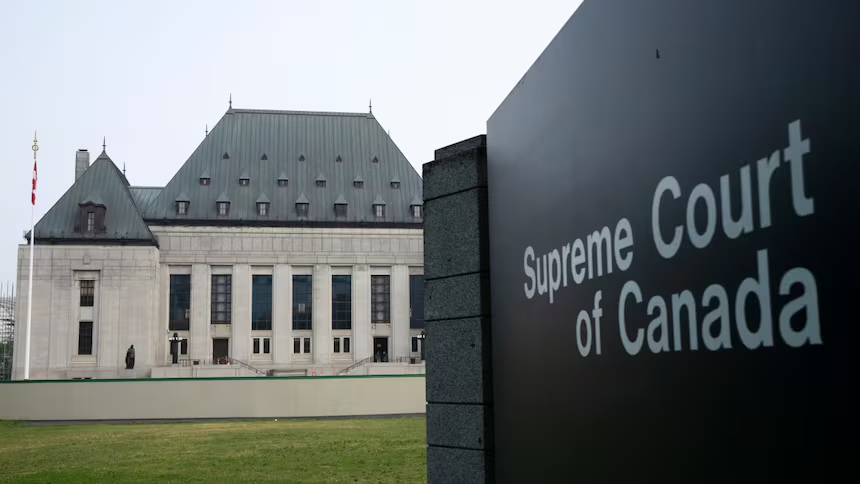Latest News
- Nearly half a million Canadians left the emergency room last year before seeing a doctor; An crisis in the system
- “New law in Ontario; Should drunk drivers pay child support?
- Dogs also found a shuttle service
- The third fatal pedestrian accident in Hamilton
- The Canadian Mint Unveils 2025 Opulence Series Ultra-Luxury Coins
Latest Ads
-
Jasmine Jewel
Call
-
Omidan group
Call
-
Amir Madanpour
Call
-
Dimo studio
Call
-
Yorkacademy
Call
-
Maryambagheri
Call
-
Shishlix Restaurant
Call

Supreme Court of Canada reinstates Alberta teacher's six-year sentence in child sexual abuse case, rejects 'perfect victim' stereotypes
Supreme Court of Canada ruling in historic Alberta sex abuse case rejects ‘myths and stereotypes’ about sex crimes
Supreme Court releases reasons for reinstating six-year sentence in sex abuse case
The Supreme Court of Canada has stressed in a ruling in a historic Alberta sex abuse case that courts have a duty to treat sex crimes against children with special sensitivity.
Paul Shepherd was brought before authorities in April, about two months after being granted full parole, when the Supreme Court unanimously agreed to the prosecutor’s request and reinstated the six-year sentence imposed in 2021.
Shepherd, now in his 60s, was convicted of “sexual interference” and “inviting sexual contact” with a child. The victim in the case is Stacey Easton. The abuse occurred in the early 1990s, when Easton was a seventh-grade student at St. John’s School in Alberta, in a sexual community; where Shepard worked as a teacher.
The Supreme Court released its reasons for its ruling on Friday, citing several flaws in the 2023 Alberta Court of Appeal decision that reduced Shepard’s sentence to less than four years.
Chief Justice Richard Wagner wrote that one of the problems with the decision was its reference to “myths and stereotypes” about victims of sexual abuse.
“In particular, it is no longer accepted that because a victim has not confronted their abuser, they are less credible. ... There is no uniform or predictable pattern of behavior for victims of sexual abuse.”
The court’s reasons also found that Shepard had “a pattern of abusing children in positions of power,” an issue that was not raised in the trial court or on appeal.
Easton, who won a restraining order in 2021, said:
“The appeal was so offensive, so backward, so intrusive, so much of an attack on me that I find this ruling a necessary correction and I am grateful for it.”
He added that the legal process — which has dragged on for years after the trial — has been extremely difficult to navigate and that he has had virtually no role in it.
“I’m glad they believed me and I’m glad that this notion of the ‘perfect victim’ is starting to fade away,” Easton said. “But I still think it takes away the agency of the victim.”
Shepherd’s past convictions
At the Supreme Court hearing in April, Wagner asked Shepherd’s lawyer about his past criminal convictions.
Shepherd was charged with molesting and assaulting young boys in the mid-1980s, when he was briefly a police officer in Stratford, Ontario. He was convicted of six counts of assault in 1987 in order to have the sexual assault charges dropped from his record.
The issue was never raised in the 2021 trial, and both the trial and appeal rulings stated that he had no criminal record. However, the Parole Board of Canada’s decisions referred to the 1987 convictions.
Wagner recalled that his lawyer had asked him in court whether he had a criminal record, and he had said no. “Isn’t that perjury?” the judge asked.
“I don’t think so,” his lawyer replied, claiming he himself was unaware of his client’s criminal record.
Shepherd was also prosecuted in the UK for sexual abuse at a boarding school, but was acquitted in 2015.
Lawyers’ response
The Raoul Wallenberg Centre for Human Rights was the only intervening party in the case in the Supreme Court.
The centre’s senior counsel, Angela Marinos, argued that the Alberta Court of Appeal incorrectly relied on 10 misconceptions about sexual violence, including that if the complainant is in treatment, they may be less trustworthy.
“In my almost 25 years of practice, I have never seen a decision that is so ignorant and misleading. It’s as if it came from ancient times,” Marinos said.
She stressed the importance of the Supreme Court’s determination that historical sexual crimes against children “are just as serious today and demand the same level of accountability.”
The ruling also noted that the sentencing should be viewed “through the lens” of the Supreme Court’s decision in Friesen (2020), which called for increased sentencing for sexual crimes against children.
“For survivors of sexual violence and children whose trust has been broken, it can take a lifetime to heal. No legal decision can fully make up for that. "But if a verdict can be a kind of salve, I think this one is."
News source
Suggested Content
Latest Blog
Login first to rate.
Express your opinion
Login first to submit a comment.
No comments yet.


































